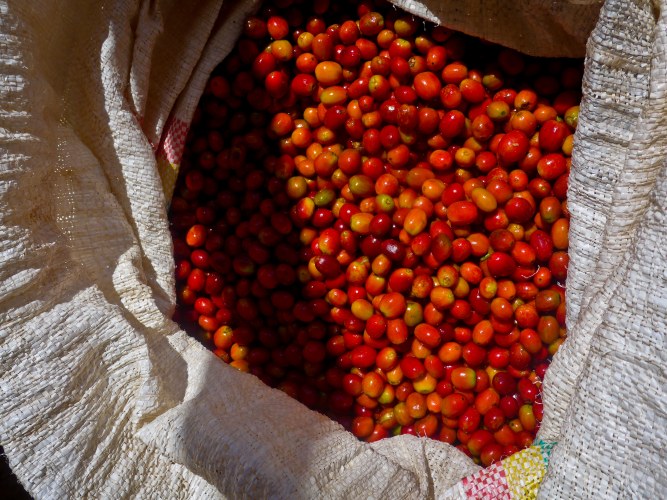
Arabica coffee production in the Democratic Republic of Congo faces serious challenges, mainly due to the very low prices on the global market. Producers still depend largely on intermediaries who market their coffee without providing any services in return. To address this, our programme supports coffee producers in setting up cooperatives dedicated to processing high-quality coffee and helps connect them with gourmet coffee buyers.
Global demand for high-quality coffee is rising, but coffee production is at risk. Rising temperatures, adverse weather, and natural disasters threaten the mountain slopes that this high-altitude plant requires to thrive.
Arabica coffee production in the Democratic Republic of Congo faces serious challenges, mainly due to low prices on the global market. Producers still rely heavily on intermediaries who sell their coffee without providing any services in return. Many coffee farmers are exploited by these intermediaries, who offer loans for the latest coffee harvest at extremely low rates. As a result, coffee farmers are struggling to survive.
In addition, excessive taxation compared to neighbouring countries, combined with systematic complicity of certain government departments in the fraudulent export of Congolese coffee, further weakens the sector. The volume of coffee exported through official channels is reduced to as little as one-tenth of the capacity. Moreover, Congolese coffee has a poor reputation, and high-quality producers are not properly rewarded because they lack direct access to the international market.
Our programme supports coffee producers in establishing cooperatives for processing high-quality coffee and connects them with gourmet coffee buyers. These cooperatives are organised around micro-washing stations, each serving about one hundred members with nearby coffee fields. Each micro-washing station functions as a section of the cooperative.

Congolese coffee is so rich in flavour, you’ll be hooked.
Five cooperatives have been established and legally registered: Kawa Maber (Mahagi), Bblo Kawa (Djugu), Kawa Kanzururu (Rwenzori), Kawa Kabuya (Beni-Lubero), and SCPNCK (Idjwi Island).
Each coffee farmer who became a member of one of the four coffee cooperatives contributed $50 in cash or in kind for construction materials and worked to build a micro-washing station, while the program supported them by providing equipment (pulping machine, mesh, shading nets, drying shed roofs, hygrometer, etc.).
There are 123 micro-washing stations in operation (as of April 2020, not all yet indicated on Google Maps) and dozens more in preparation. Each operational micro-washing station employs five staff members (responsible for post-harvest processing and quality control), creating a total of 520 new jobs. In addition, 27 staff members work directly for the cooperatives.
Another significant result is the easy access to new coffee plantations, leading to the renewal of coffee farms. Productivity continues to increase: the volume of the five cooperatives grows each year.
Before the start of the season, the cooperatives sign delivery contracts with buyers. These contracts serve as collateral with credit institutions. This credit enables cooperatives to process coffee under optimal conditions to produce high-quality coffee.
Coffee quality has improved significantly. As a result, the income of farming families has doubled or even tripled within a year and a half. Many farmers report that they can now easily afford their children’s school fees. School dropouts among underprivileged children have decreased.
The workload of women has decreased considerably: they no longer need to handle coffee processing at home. Many men have transferred a significant share of their coffee trees to their wives, resulting in greater economic independence for women.
Thanks to advocacy efforts, the four state agencies under the Ministry of Finance have reduced their service fees from several percent down to 0.25% of the FOB value of coffee. Only one of them (DGDA) collects the tax on behalf of all four and ensures its redistribution.

Structural changes in national coffee policies and the restructuring of the coffee value chain at the national level by the National Confederation of Agricultural Producers of Congo (CONAPAC).
